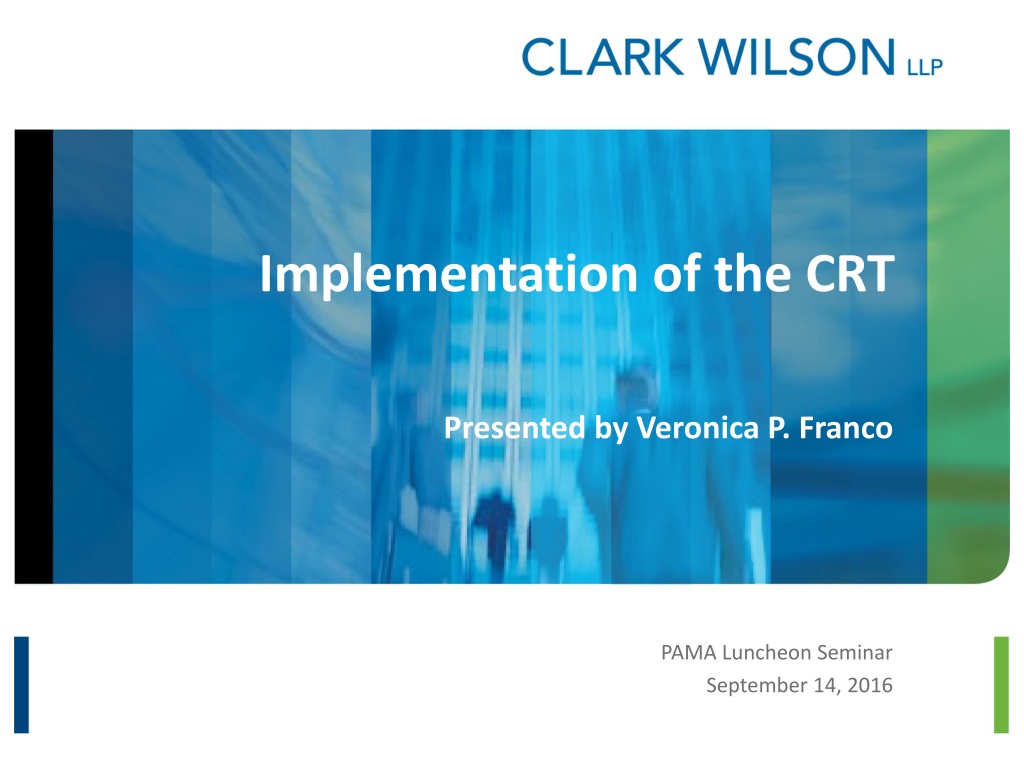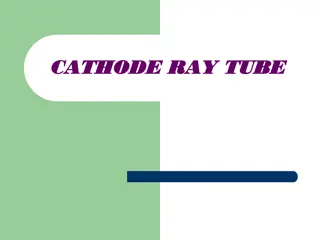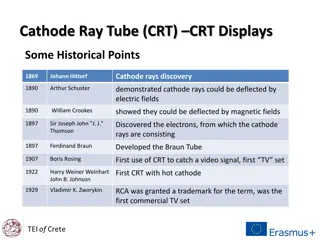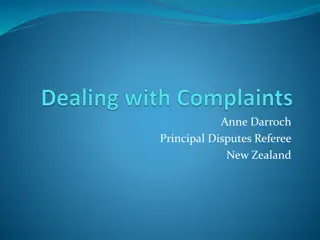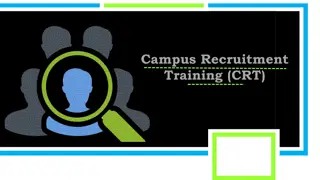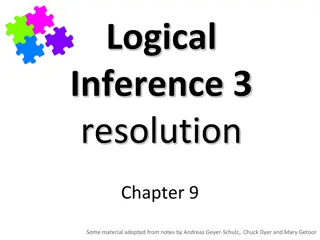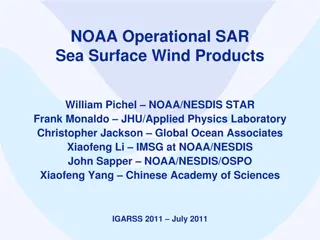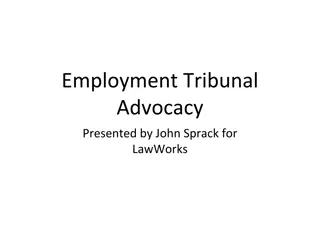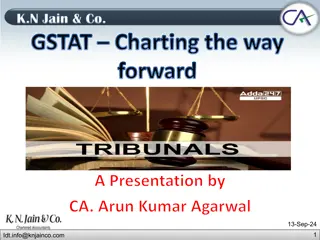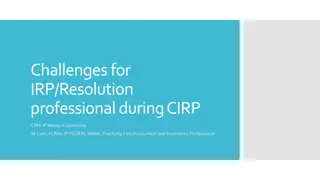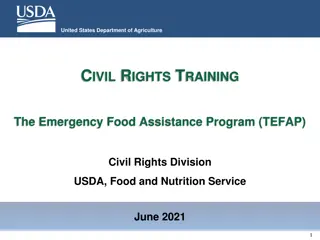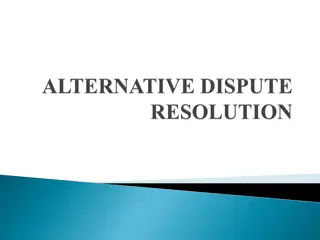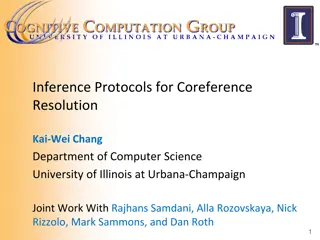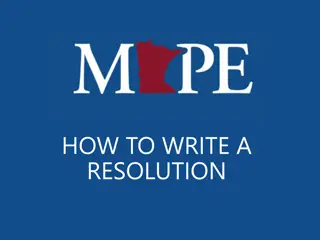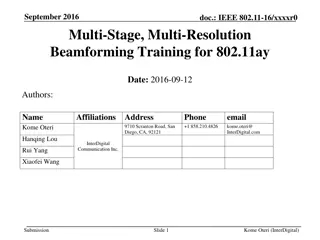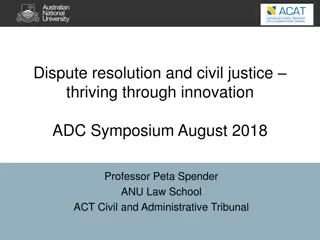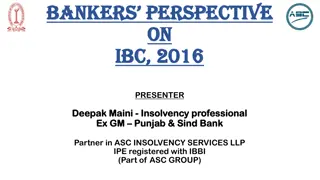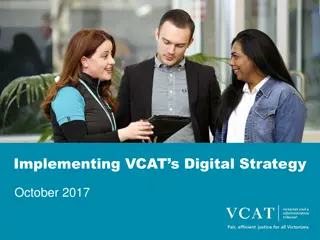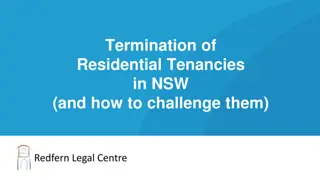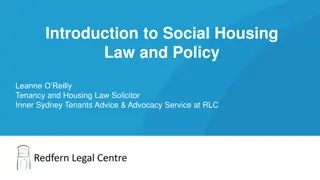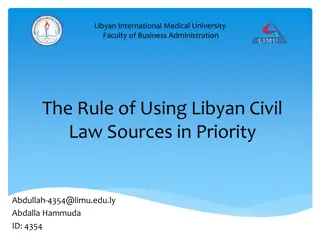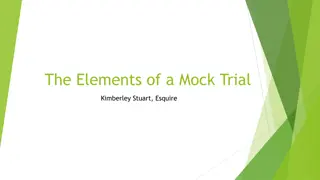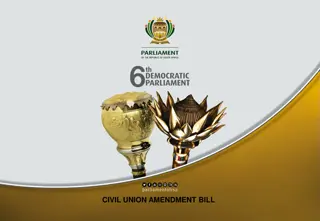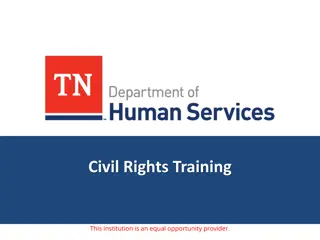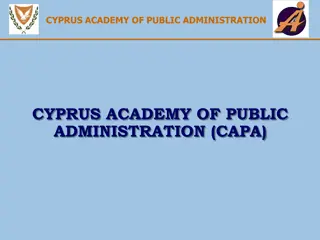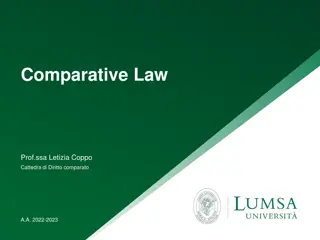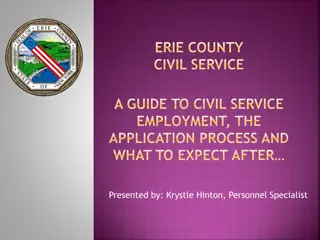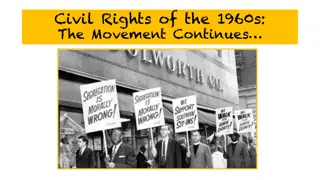Understanding the Civil Resolution Tribunal (CRT)
Civil Resolution Tribunal (CRT) is introduced as a place to resolve strata-related disputes in an accessible, speedy, and economical manner. It aims to encourage agreement between parties or decide claims. CRT's mandate includes providing fair dispute resolution services using electronic tools. The process involves three stages: Solution Explorer, Case Management, and Tribunal, facilitating parties to resolve disputes effectively. CRT's jurisdiction covers a range of strata-related disputes, ensuring a fair and efficient resolution process.
Download Presentation

Please find below an Image/Link to download the presentation.
The content on the website is provided AS IS for your information and personal use only. It may not be sold, licensed, or shared on other websites without obtaining consent from the author. Download presentation by click this link. If you encounter any issues during the download, it is possible that the publisher has removed the file from their server.
E N D
Presentation Transcript
Implementation of the CRT Presented by Veronica P. Franco PAMA Luncheon Seminar September 14, 2016
Civil Resolution Tribunal (CRT) - Introduction Place where disputes relating to strata matters are resolved by encouraging agreement between the parties or by having the tribunal decide claims (CRT Act, s.2(4)) It is meant to replace the Supreme Court or Small Claims Court. Unlike Court, most of the CRT functions electronically 2
CRT - Mandate Ensure dispute resolution services : are accessible, speedy, economical, informal and flexible applies law and fairness recognizing parties will continue to have a relationship Uses electronic tools accommodates, so far as the tribunal considers reasonably practicable, the circumstances of the parties CRT Act, s.2(2) 3
CRT Brief Overview Three stages: 1. Solution Explorer 2. Case Management 3. Tribunal 4
Solution Explorer Online self-help tool with suggestions on how to resolve strata related disputes: Information pages Sample Letters Options to resolve dispute Examples: Strata council tries to enforce bylaws; strata council has issue with strata manager 5
CRT - Claims Amendments to the SPA and Civil Resolution Tribunal Act came into force July 13, 2016 allowing for intake of strata related disputes. Jurisdiction What types of disputes can be sent to the CRT? Procedural Issues strata corporations and strata managers need to know. 6
CRT - Jurisdiction CRT resolves the following disputes concerning: the interpretation or application of the SPA, Regulations, bylaws or rules; the common property or common assets; the use or enjoyment of a strata lot; money owing, including fines, under the SPA, Regulations, bylaws or rules; an action or threatened action by the strata corporation (council) against an owner or tenant; 7
CRT Jurisdiction contd CRT resolves the following disputes concerning: a decision of the strata corporation (council) in relation to an owner or tenant; the exercise of voting rights by a person who holds 50% or more of the votes, including proxies, at an annual or special general meeting. CRT Act, s.3.6(1) 8
CRT Jurisdiction contd Disputes not covered under the CRT: council member conflict of interest (SPA, s. 33) Deeming unanimous votes unanimous (SPA, s. 52) Court application to appoint voter (SPA, s.58) Builders lien removal applications (SPA, ss. 89 and 90) Forced sales lien enforcement (SPA, s.117) Amend Schedule of Unit Entitlement (SPA, s.246) 9
CRT Jurisdiction contd Disputes not covered under the CRT: Rebuild insured damaged property (SPA, s. 160) Deem vote special levy resolution passed (SPA, s.173(2)) Application for administrator (SPA, s.174) Leasehold landlord application (SPA, ss. 208 and 209) Phased developments applications (SPA, ss. 226(1)) Applications relating to wind-ups of strata corporation (SPA, ss. 272, 273.1, 278.1, 279 and 284) CRT Act, s.3.6(2) 10
CRT Jurisdiction contd Disputes that are not exclusively strata matters: Contract disputes Negligence claims (not related to bylaws, SPA or Regs) Constitutional questions Residential Tenancy issues that trigger Part 5 of the RTA Parties agree Arbitration Act applies Conflicts between the HRC and the SPA, and CRT may decline jurisdiction over HRC CRTAct, ss. 3.6(3) and 3.8 11
CRT Other Claims that CRT will refuse the dispute has been resolved through a legally binding process; the dispute does not disclose a reasonable claim or is an abuse of process; issues in the dispute are too complex for CRT procedures or otherwise impractical for the CRT to case manage or resolve; if the Supreme Court is likely to grant an order that the tribunal not resolve the claim CRT Act, s.11(a) 12
CRT - Jurisdiction Can apply to Supreme Court for order that CRT should not resolve dispute because: 1. CRT does not have jurisdiction; 2. it is not in the interests of justice and fairness for the tribunal to resolve the claim CRT Act, s. 12.3 SPA, S.189.6 13
CRT Jurisdiction contd The following factors are considered in determining the interests of justice and fairness question: whether the electronic tools in the CRT process would be unfair to a party in a way that cannot be accommodated by the CRT; whether there is an issue that is of such public interest or importance that precedent should be established; whether an issue raised by the dispute relates to the constitution or the HRC; 14
CRT Jurisdiction contd whether an issue raised by the dispute is sufficiently complex to benefit from being resolved by the Supreme Court; whether all of the parties to the dispute agree that the dispute should be resolved by the Supreme Court; whether the claim should be heard together with a claim currently before the Supreme Court. CRT Act, s. 12.3 SPA, s.189.6 15
Court and Arbitrations Supreme Court must decline jurisdiction to hear matter if it determines CRT has jurisdiction (unless having the CRT resolve is against the interests of justice and fairness) SPA, s.189.6(1) Supreme Court, arbitration and Small Claims actions are suspended or cannot be started after CRT is started SPA, s.178.1, CRT Act, s.15 CRT will not accept dispute if hearing or trial has been scheduled in court proceedings started before CRT claim CRT Rules, s.50 16
CRT - Pre-Requisites For strata corporation no vote authorization necessary to initiate claim remember funding SPA, s. 189.4 For owners or tenants before initiating a claim, they must attend a hearing before the council unless the CRT directs that a hearing is not necessary SPA, s.189.1(2) Occupants cannot initiate CRT claims they have no standing SPA, s.189.2 17
CRT Who participates Designed for parties to speak for themselves Representative allowed to represent a child or person with impaired capacity or if in the interests of justice and fairness, the tribunal grants permission, considering: 1. Is the other party represented? 2. Other parties have agreed to the representation. Representative must be a lawyer or person supervised by a lawyer, or if the tribunal agrees is an appropriate person to do so (i.e. spouse, relative or friend) CRT Act, s.20; CRT Rules, ss. 37 and 38 18
CRT Who participates Strata Corporations can only act through : 1. Authorized member of the strata council Anyone else requires an application to the tribunal CRT Rules, s. 42 19
CRT Initiating the Claim Dispute Application Form and fee ($150) online: Names, email and mailing addresses of the applicants Names and mailing addresses of all the respondents Strata corporation s legal name and address A description of the dispute A description of the remedy you are seeking A description of the evidence you have The name and contact of your representative if you plan to ask for permission to have one act for you 20
CRT Vetting of Claim CRT reviews the Dispute Application Form and does one of 3 things: 1. Asks for more information; 2. Provides reasons for rejecting the application; or 3. Sends applicant a Dispute Notice to serve respondents Applicant has 90 days to serve Dispute Notice and blank Dispute Response Form to every respondent. CRT Rules, ss.49, 51 21
CRT Serving the Dispute Notice Service on an owner by email, fax, registered mail, courier with proof of delivery and in person; email sufficient only if owner confirms receipt On a strata corporation registered mail, courier or in person to mailing address registered at LTO or in person to a council member CRT Rules, ss.52 to 54 and 62 22
CRT Responding to a Dispute Notice Dispute Response Form (plus fee of $25) due 14 days from date of service Can include an Additional Claim ($150) Can add a party to the dispute by notifying of your intention to do so in the Dispute Response Form, then start a new Dispute Resolution Application ($150) and ask that the two Disputes be heard together. CRT Rules, ss.73 to 76 23
CRT Responding to a Dispute If you miss deadline, 1. applicant can apply for default ($30). 2. Tribunal can resolve dispute if applicant does not apply for default within 100 days of Dispute Notice Respondent can later apply to set aside default: factors 1. Reasons for non-compliance illness, accident 2. Respondent is acting in good faith 3. Reasons for any delay in bringing application 4. Evidence to support reasons. CRT Rules, ss. 80-81 and 133- 137 24
CRT Case Management Stage Case Manager is appointed role: 1. Assist resolving dispute through facilitated settlement; 2. Assist in identifying relevant facts and issues; 3. So far as practicable, determine evidence and other information; and 4. Make recommendations to the tribunal regarding process 25
CRT - Facilitation Create a facilitation plan with process, steps to be taken, and timelines Facilitator: Assist with communication between parties regarding evidence, positions and ability to pay; Direct what further information/evidence needed Recommend adding a party and determine steps to do so Refer dispute to tribunal Provide non binding neutral evaluation 26
CRT - Facilitation Facilitator can also do the following, with consent: Recommend to the tribunal as to the final decision, which the tribunal must consider Resolve dispute (if facilitator is also a Tribunal Member) Once Facilitator satisfied that settlement not possible: Tell parties that this stage is over and ask applicant to pay fee to move to Tribunal Stage; If neither party pays fee, Tribunal can refuse to resolve dispute or dismiss it. 27
CRT - Facilitation After Facilitated Settlement Stage, Facilitator provides Tribunal Decision Plan, which provides directions on: Information/evidence/records/positions/agreed statements of facts/submissions to be provided Steps to be taken and timelines Date the tribunal will provide decision Witnesses and their documents can be summoned 28
CRT Preparing for Tribunal Stage Facilitator will confirm Tribunal Decision Plan is complete. Determine format and length of decision process. Set the start date of decision process. Provide further instructions to prepare Failure to comply with Tribunal Decision Plan can lead to default judgment or dismissal or costs. Experts tribunal decides if expert is qualified 29
CRT Tribunal Stage Tribunal has a lot of discretion in determining its procedure including sending it back to facilitation. Decision due by deadline unless CRT Chair grants extension. Tribunal Members must provide final reasons. While they can be given orally, a written record of the order must be provided. Upon request, the Tribunal Member must provide formal written reasons. 30
CRT - Decision Tribunal can order: 1. A party to do something; 2. A party to refrain from doing something; 3. A party to pay money (including Court Order Interest) Also the tribunal can make an order directed at the strata corporation, council, or person who holds 50% or more of the votes, if the order is necessary to prevent or remedy significant unfairness. Tribunal cannot order the sale of a strata lot. 31
CRT Decisions Enforcement Registered in Supreme or Small Claims Court To file in Supreme Court: 1. Final decision must be an approved draft consent resolution plan; 2. Time for an appeal has expired (28 days); 3. Leave to appeal is denied; or 4. The appeal is heard and the decision has been confirmed. Can apply for contempt of court for breach of order 32
CRT Decisions Enforcement In Small Claims Court: Monetary judgment or return of personal property; The value of the judgment is less than monetary limit ($25,000 currently) 33
CRT Appeals Appeal in Supreme Court with leave or by consent for questions of law. Leave granted if it is in the interests of justice and fairness to do it, considering: Whether the issue is of such importance to establish a precedent; Whether the issue involves the constitution or HRC; The importance of issue to the parties; Principle of proportionality 34
CRT Power of Appellate Court They can confirm, vary or set aside decision. They can also refer matter back to tribunal. 35
Conclusion Encourage council members to become familiar with CRT undertake minor claims; Explore Solution Explorer; If you receive a Notice of Complaint, respond with 14 days Will the council want to enlist a helper? Is a legal representative appropriate? 36
These materials are necessarily of a general nature and do not take into consideration any specific matter, client or fact pattern. Please direct inquiries or comments to: Veronica P. Franco vpf@cwilson.com 604-891-7714 www.cwilson.com THANK YOU
